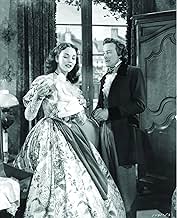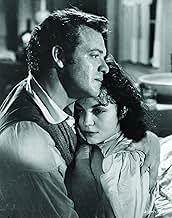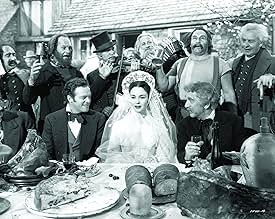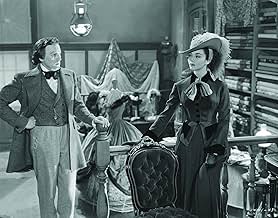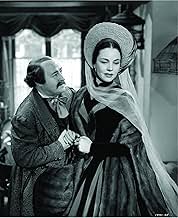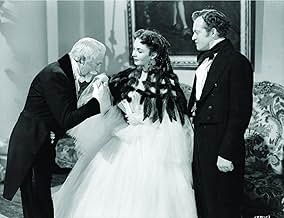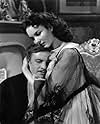A provincial doctor's wife's romantic illusions about life and social status lead her to betray her naive husband, take on lovers, and run up ruinous debts.A provincial doctor's wife's romantic illusions about life and social status lead her to betray her naive husband, take on lovers, and run up ruinous debts.A provincial doctor's wife's romantic illusions about life and social status lead her to betray her naive husband, take on lovers, and run up ruinous debts.
- Nominated for 1 Oscar
- 1 nomination total
Alf Kjellin
- Leon Dupuis
- (as Christopher Kent)
Harry Morgan
- Hyppolite
- (as Henry Morgan)
- Director
- Writers
- All cast & crew
- Production, box office & more at IMDbPro
Storyline
Did you know
- TriviaAfter the expensive box-office failure of The Pirate (1948), director Vincente Minnelli worked hard to cut corners on this film, fearing he might be accused of extravagance. However, he devoted a great deal of time to the ball sequence, which he regarded as the most important scene in the film; he even had composer Miklós Rózsa compose the waltz theme used in it well in advance of the start of filming.
- GoofsWhen Madame Bovary asks Leon for money, he reacts by punching out one of the glass window panes. But on the next cut, the previously shattered window pane is now intact.
- Quotes
Emma Bovary: Do you know, Charles, why that clock strikes? To announce the death of another hour.
- Alternate versionsAlso shown in a computer colorized version.
- ConnectionsFeatured in Some of the Best: Twenty-Five Years of Motion Picture Leadership (1949)
Featured review
This MGM film sure sports a terrific cast--Jennifer Jones, James Mason, Van Heflin and Louis Jordan! However, no matter how good the cast and production values are, this is a film that was very, very difficult to produce in 1940s Hollywood due to the restrictions of the Production Code. This code precluded the film from fully realizing Flaubert's novel, as frank discussions of sexuality were not possible--the film never would have been cleared for public exhibition. So, the studio softened it here and there--and reduced the impact any film about this book could have had. I am sure a more modern version of the book would be quite a bit different--ad Madame Bovary's infidelities been a lot less vague.
The film begins with Dr. Bovary coming to Emma's home to treat her father. The Doctor is quite taken by her and eventually marries her--making her Madame Bovary. While quite pretty, there are some serious warning signs that went unnoticed. First, Emma was a bit childish and lived in a fantasy-sort of world where she expected real life to be like a romance novel! As a result, she's ill-equipped to deal with the boredom that comes with everyday life--as she expects constant passion, excitement and variety--not knowing even the rich and powerful live that way! Second, there is a huge disparity between the head in the clouds Emma and her rather nice but bland husband. He cannot possibly live up to her ridiculously high expectations of a man--and soon she goes searching for excitement on her own. Not surprisingly, she gravitates towards affairs, though in time, these, too, are unsatisfying--even lovers cannot always create excitement and distractions. Eventually, this leads to disaster and the story ends.
Not surprisingly, many story elements have been omitted--some due to the code and some due to the confines of a full-length film. For example, the Doctor's first marriage and significant periods in Emma's life are absent--though the spirit of the book is mostly intact.
While not exactly intended, the film seems to be an interesting portrait of what we might now consider to be a Borderline Personality or at least a person with strong Borderline traits. The inability to cope with boredom, interpersonal shallowness, the tendency to self-sabotage and craving for excitement and addiction (in this case, sexual and spending addiction) are all important hallmarks of this disorder. Such classifications were unknown in Flaubert's time, though he clearly seems to be describing such a person in Emma Bovary.
There is only one problem with such a portrait, however. Emma Bovary is in no way sympathetic--she is selfish, vain and pretty stupid. And, to make things worse, her husband is an utter fool as well, as he willfully ignores his wife's 'excesses'. As a result, it's a lovely movie to watch (it is a very glossy MGM production) but its also detached and hard to love...much like Madame Bovary herself!
The film begins with Dr. Bovary coming to Emma's home to treat her father. The Doctor is quite taken by her and eventually marries her--making her Madame Bovary. While quite pretty, there are some serious warning signs that went unnoticed. First, Emma was a bit childish and lived in a fantasy-sort of world where she expected real life to be like a romance novel! As a result, she's ill-equipped to deal with the boredom that comes with everyday life--as she expects constant passion, excitement and variety--not knowing even the rich and powerful live that way! Second, there is a huge disparity between the head in the clouds Emma and her rather nice but bland husband. He cannot possibly live up to her ridiculously high expectations of a man--and soon she goes searching for excitement on her own. Not surprisingly, she gravitates towards affairs, though in time, these, too, are unsatisfying--even lovers cannot always create excitement and distractions. Eventually, this leads to disaster and the story ends.
Not surprisingly, many story elements have been omitted--some due to the code and some due to the confines of a full-length film. For example, the Doctor's first marriage and significant periods in Emma's life are absent--though the spirit of the book is mostly intact.
While not exactly intended, the film seems to be an interesting portrait of what we might now consider to be a Borderline Personality or at least a person with strong Borderline traits. The inability to cope with boredom, interpersonal shallowness, the tendency to self-sabotage and craving for excitement and addiction (in this case, sexual and spending addiction) are all important hallmarks of this disorder. Such classifications were unknown in Flaubert's time, though he clearly seems to be describing such a person in Emma Bovary.
There is only one problem with such a portrait, however. Emma Bovary is in no way sympathetic--she is selfish, vain and pretty stupid. And, to make things worse, her husband is an utter fool as well, as he willfully ignores his wife's 'excesses'. As a result, it's a lovely movie to watch (it is a very glossy MGM production) but its also detached and hard to love...much like Madame Bovary herself!
- planktonrules
- Sep 10, 2010
- Permalink
- How long is Madame Bovary?Powered by Alexa
Details
- Release date
- Country of origin
- Official site
- Language
- Also known as
- Madame Bovary und ihre Liebhaber
- Filming locations
- Production company
- See more company credits at IMDbPro
- Runtime1 hour 54 minutes
- Color
- Aspect ratio
- 1.37 : 1
Contribute to this page
Suggest an edit or add missing content



